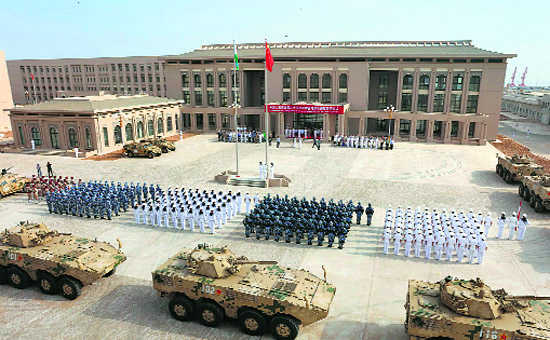
NEW BASE: In this file photo taken on August 1, 2017, Chinese People's Liberation Army personnel attend the opening ceremony of China's military base in Djibouti. AFP
Bhartendu Kumar Singh
Indian Defence Accounts Service
When China acquired its first military support base in Djibouti in Africa in 2015, it was an indication of the Middle Kingdom's recasting as an expansionist military power beyond the Asia-Pacific. However, Djibouti could be just the beginning of China's Africa dream, best reflected in recent China-Africa defence and security forum (June 26 to July 10) that included chiefs from 50 African countries. This first ever exercise may facilitate China to consolidate and expand its military ties with African countries and position itself as a formidable power in the continent.
Beijing may have taken a cue from the US that hosted a similar exclusive summit on defence and security with Africa last year through its Africa Command (Afcom), but has its own compelling reasons for military engagement with Africa.
1 China is Africa's largest trading partner, the volume of bilateral trade being $170 billion in 2017. Chinese loans in Africa exceed $100 billion and more than 1 million Chinese workers are spread all over Africa. Africa also figures in China's Belt and Road Initiative (BRI). However, the mercantilist excesses have led to local protests against China's overbearing presence in many countries. The existing China-Africa Cooperation Action Plan (2016-18) meant for deepening cooperation with African militaries is not yielding desired dividends and needs new supplements to protect Chinese interests.
2 China carries a single-dimensional power image in Africa, and therefore, has adopted a calibrated military power projection strategy. After securing its frontiers and consolidating its position in South China Sea, the Chinese People’s Liberation Army (PLA) is out on 'new historical mission' to explore far-off oceans and lands. The westward movement of the Chinese PLA has been gradual but consistent - through increased naval presence in the Gulf of Aden for anti-piracy operations, increased stakes in adjacent ports of Gwador (Pakistan), Hanumantota (Sri Lanka) and fraternising island states of the Maldives and the Seychelles. Now, according to a recent RAND publication, China is also looking for strategic pre-positioning in key African locations to protect its vital interests.
3 Great powers engage in a relentless pursuit of economic and military power rather endlessly and look for extra-territorial catchment areas with their rising profile. Established and declining great powers have colonies or territories far outside their own territories, inherited from pre-World War II days (except Russia). China, as a post-colonial great power, would like to carve out its own sphere of influence and consolidate its position in Africa, more so since the African economy has taken off in recent times.
4 Africa is an emerging market for defence weapons. As per SIPRI figures, its defence expenditure increased by 28 per cent between 2008 and 2017, defying the declining trend in some other continents. During this period, African countries purchased Chinese weapons worth $3 billion, accounting for 21 per cent of the latter's global arms exports. But the buoyancy of African countries, presence of inter-state and intra-state conflicts, supplemented by the cost-effectiveness of Chinese weapons, mean a potentially huge market for Chinese products in future. Perhaps, that explains why China took pains to expose visiting delegates to the vastness of Chinese domestic military industrial complex (MIC)!
The presence of almost all African countries in the defence forum shows that China still enjoys considerable favourable opinion amongst the local regimes despite its so-called neo-colonial practices. The forum may become a regular exercise, akin to the Forum on China-Africa Cooperation (FOCAC), slated to meet at Beijing in September, 2018. China is likely to expand the network of training exercises, place more defence attaches in African capitals and send more military delegates to explore the African market.
In this context, the increase in size and functionalities of Chinese peacekeeping formations in Africa needs a mention. Not long back, Chinese peacekeepers in Africa were quite small in number and did not take combat functionalities. Instead, as this author observed as a UN peacekeeper in Sudan, China used its troops for intelligence-gathering for exploring the local market and had geologists, agriculturists and economists in its formations masquerading as peacekeepers. China has also used its peacekeeping operations in Africa to market its military diplomacy duly reflected through wide coverage on its ministerial website. China had amply benefited from this approach. When Sudan was united, China was selling weapons to President Bashir's regime in return for monopoly over oil production. Now China does the same with respect to the successor state of South Sudan.
It is debatable if Africa would come under the Chinese military sphere of influence so soon! Djibouti has only a single berth for incoming Chinese ships and space for one helipad. It also hosts half a dozen other countries, including the US. Geographical distance would also severely limit Chinese military power projection and make them thinly spread in Africa. Above all, the US is still well placed, selling 50 per cent more arms than China, has a dedicated theatre command and a ring of bases in association with the UK and France.
China probably understands this and, therefore, may not confront the US and allies directly or indirectly in Africa. Instead, it would focus upon consolidating its presence through geo-economic tools and supplement them with increased military forays. Thus, for the foreseeable future, China's increasing military presence may remain largely symbolic and non-threatening to regional order and security.
Views are personal




















